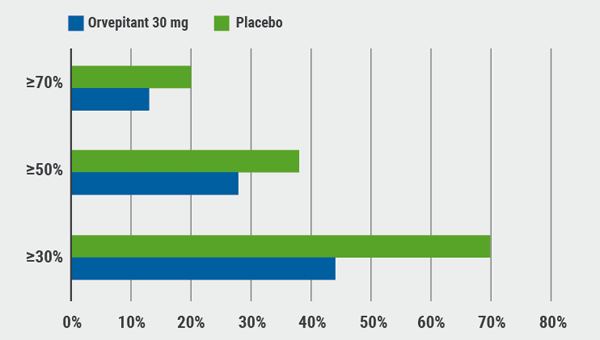https://doi.org/10.55788/4521adcb
Dupilumab induced meaningful improvements in small airway dysfunction, resulting in improved ventilation and lung function, in patients with moderate- to-severe type 2 inflammatory asthma. The safety of dupilumab was similar to placebo in this study and comparable with previously published data on the safety of this agent.
The phase 4 VESTIGE trial (NCT04400318) is an imaging study that investigates the effect of dupilumab on airway inflammation and structural and functional lung changes in adult patients with uncontrolled moderate- to-severe asthma [1]. The study randomised 109 participants 2:1 to dupilumab, 300 mg subcutaneously administered every 2 weeks, or a placebo. Dr George Washko (Brigham and Women’s Hospital, MA, USA) discussed the results after 24 weeks of therapy.
The positive change from baseline to week 24 in pre- and post-bronchodilator FEF25– 75% was significantly higher in participants treated with dupilumab than in those who received placebo (P<0.001; P<0.01). “The effect was apparent as early as 4 weeks after treatment initiation,” added Dr Washko. Also, the airway wall thickness was significantly reduced in the dupilumab arm compared with the placebo arm after 24 weeks. Furthermore, both in the lower lung and in the upper lung, the increase from baseline to week 24 in ventilation/perfusion at total lung capacity was significantly larger in the dupilumab arm compared with the placebo arm (P<0.05; P<0.05).
Finally, the reduction from baseline to week 24 in mucus plug score was significantly larger in participants on dupilumab versus placebo (P<0.001).
- Washko GR, et al. Effect of dupilumab on airway oscillometry, ventilation/perfusion, and mucus plugging in moderate-to-severe asthma: the VESTIGE trial. Late-breaking abstracts: science that will impact clinical care. ATS 2024, 17–22 May, San Diego, USA.
Medical writing support was provided by Robert van den Heuvel.
Copyright ©2024 Medicom Medical Publishers
Posted on
« Is the Apnea Hypopnea Index ready to be replaced? Next Article
UCAP: Identify and treat undiagnosed COPD or asthma »
Table of Contents: ATS 2024
Featured articles
NOTUS: Dupilumab safe and efficacious in COPD with type 2 inflammation
Sulthiame may be the next treatment for OSA
Miscellaneous Topics
Pirfenidone may alleviate disease burden in DRCB
Can mindfulness reduce depression and anxiety in ICU survivors?
Exercise and diet improve functional status in PAH
Idiopathic Pulmonary Fibrosis
STARSCAPE: Zinpentraxin alfa does not ameliorate health status in IPF
COPD
COURSE: Encouraging results for tezepelumab in COPD
Ensifentrine delays transition from GOLD B to GOLD E in COPD
NOTUS: Dupilumab safe and efficacious in COPD with type 2 inflammation
BOREAS: Blood eosinophil count and FeNO levels predictive of dupilumab response in COPD
Respiratory Infections
Two regimens deliver high sputum conversion rates in M. xenopi pulmonary infection
Patient-reported outcomes improve practice in MAC lung disease
Novel RSV vaccine to prevent serious respiratory illness
Asthma
UCAP: Identify and treat undiagnosed COPD or asthma
Structural and functional lung improvement with dupilumab in asthma
Obstructive Sleep Apnea
Is the Apnea Hypopnea Index ready to be replaced?
Does PAP therapy truly reduce mortality in OSA?
Sulthiame may be the next treatment for OSA
Related Articles
Update on treatment of fibrotic ILD

Orvepitant successful in decreasing symptoms of chronic cough
New guidelines for IPF and PPF
© 2024 Medicom Medical Publishers. All rights reserved. Terms and Conditions | Privacy Policy
HEAD OFFICE
Laarderhoogtweg 25
1101 EB Amsterdam
The Netherlands
T: +31 85 4012 560
E: publishers@medicom-publishers.com

